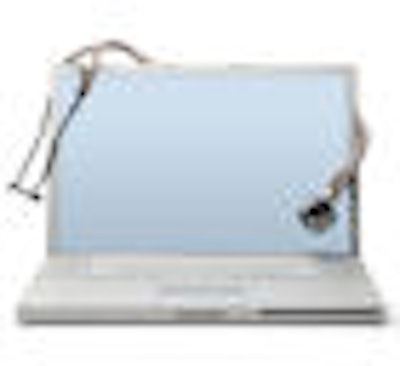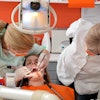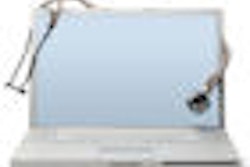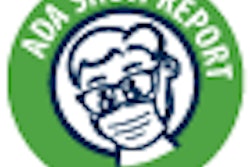
While electronic health records (EHRs) offer many advantages to the practice of dentistry, they also open the door to questions of patient privacy and security. Nowhere is this more evident than in the current dental school environment, according to an article on the ethics of EHRs in the Journal of Dental Education (JDE, May 2012, Vol. 76:5, pp. 584-589).
"Electronic health records are a major development in the practice of dentistry, and dental schools and dental curricula have benefitted from this technology," wrote co-authors Robert Cederberg, DDS, and John Valenza, DDS, of the University of Texas Health Science Center at Houston. "Quick and easy access to patient data has allowed practitioners to be more efficient with the delivery of patient care and has streamlined consultations, referrals, and multispecialty care."
When compared to paper records, EHRs make it easier to input, duplicate, store, retrieve, manipulate, transmit, and archive patient data, the authors noted. However, the evolution from paper to electronic charts has also prompted concern for the safety and privacy of patient information.
"Even though the EHR offers benefits in the access and management of sensitive patient data ... it may also provide the potential for unscrupulous use of this information by persons who may purposely or inadvertently breach ethical principles," they wrote.
EHRs and depersonalization
Academic misconduct has become a hot topic, and the dental community is not immune. In 2006 and 2007, cheating scandals were discovered at dental schools in New Jersey, Nevada, Indiana, and California. And a 2007 survey in the Journal of Dental Education found that 75% of dental students admitted to cheating on exams (August 2007, Vol. 71:8, pp. 1027-1039), while a 2008 JDE study involving data from 14,000 students on three dental school campuses revealed 30 different methods for cheating, a third of them "technologically based" (March 2008, Vol. 72:3, pp. 359-363).
While it is unlikely that the EHR in and of itself can create an environment that fosters cheating in a dental school setting, "the use of an electronic database rather than a paper-based patient record certainly provides a vehicle that may allow the unscrupulous user a much more effective way to cheat," Drs. Cederberg and Valenza wrote.
Part of the problem with the increasing presence of computers in the operatory is the effect this has on the doctor-patient relationship, they noted. A study in the Annals of Family Medicine found that "conflict exists for the provider between interacting with the EHR and giving patients the needed one-on-one attention" (March 2006, Vol. 4:2, pp. 124-131).
As a result, "dental educators must be aware that any dissociation between today's dental student and the patient could be further compromised by the electronic tools and opportunities provided to the student via an EHR," wrote Drs. Cederberg and Valenza in the JDE paper. "This depersonalization ... may create an opportunity for an ethical breach."
In fact, the very thing that makes EHRs so attractive to so many people -- easier access to data -- also makes them ripe for a breach of ethical conduct, they added. These "opportunities for misconduct" can include the following:
- Sharing or stealing passwords or other authentication devices
- Misusing procedure codes
- Violating patient information security or privacy
- Excluding patients from participating in the electronic record because the student may fear the patient will choose a treatment that does not benefit the student's educational needs
"Many school-based electronic clinic management systems are built to allow access to the data to many different types of users, which in turn may result in increased difficulties with controlling access to certain sensitive areas of the system," the authors wrote.
Drs. Cederberg and Valenza also contend that alterations to electronic records are easier to hide than with paper-based records.
"While routine and random audits of paper-based records by faculty members can easily spot altered and missing data, it may take an IT specialist with a good working knowledge of the software to find altered or missing entries with the EHR," they wrote.
Technological safeguards
However, Titus Schleyer, DMD, PhD, director of the Center for Dental Informatics at the University of Pittsburgh, believes that many safeguards are already in place that, while not perfect, reduce the risk of security breaches when using electronic records.
"People talk a lot about the need to educate students and others about ethics, but we also need to look at the technical end to detect unethical behavior," he said.
For example, in Axium -- the clinical management system most widely used in dental schools -- any change in any field at any time is logged and a HIPAA-compliant audit trail created. In addition, there are specific HIPAA rules regarding the integrity of patient information when it is inputted and transmitted, Dr. Schleyer noted.
"HIPAA stipulates that the designer and user take precautions to ensure that the data is not altered, so you can encrypt the data to ensure it doesn't get compromised in transit," he said. "And if you do this in a conscientious manner, you may not completely eliminate the risk of a security breach, but with high-strength encryption keys you can dramatically reduce the risk."
In addition to introducing dental students to the advantages of EHRs and how they should be properly used, dental schools need to spend more time in general educating students on ethics and professionalism, according to Drs. Cederberg and Valenza. A recent survey of ethics instructors at 56 U.S. dental schools revealed that "little time is devoted to ethics instruction in the formal curriculum" (JDE, October 2011, Vol. 75:10, pp. 1295-1309).
"The ultimate goal is to minimize the potential for ethical quandaries to arise for students and faculty members," they wrote. "Dental schools must either create or reinforce an ethical culture on campus that should include students, faculty members, and staff; increase or modify the teaching of ethics to all EHR users; and consider instituting additional technologies to monitor and safeguard the EHR."



















